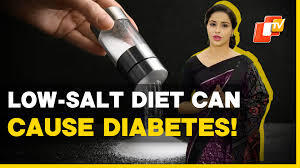Neurologists say eating a low-salt diet can lead to health problems like diabetes, high cholesterol, and even a higher chance of death. Physicians addressed the widespread notion that salt is bad for you. However, a low-salt diet can actually be detrimental to healthy people.
Adults should consume no more than 2000 mg of sodium (approximately 5 grams of salt) per day, according to WHO guidelines. Doctors have noted, however, that a diet low in salt can cause insulin resistance, which increases the risk of diabetes. It can also raise levels of LDL cholesterol, triglycerides, and total cholesterol.
Maintaining health requires sodium, which is necessary for the function of the brain, nerves, and muscles. Weakness, fatigue, lightheadedness, and in extreme situations, seizures or even death, can result from a low sodium intake. Experts advise people to maintain a normal salt intake even though too much salt can cause blood pressure to rise in those who are sensitive to it. Therefore, it is recommended that people following diets low in salt keep an eye out for signs of hyponatremia, or low sodium in the body.


.jpg)
.jpg)
.jpg)
.jpg)
.jpg)
.jpg)